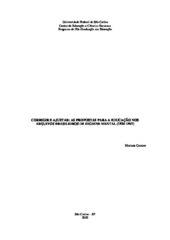| dc.contributor.author | Carraro, Mariana | |
| dc.date.accessioned | 2022-09-22T13:37:34Z | |
| dc.date.available | 2022-09-22T13:37:34Z | |
| dc.date.issued | 2022-08-31 | |
| dc.identifier.citation | CARRARO, Mariana. Corrigir e ajustar: as propostas para a educação nos Arquivos Brasileiros de Higiene Mental (1925-1947). 2022. Dissertação (Mestrado em Educação) – Universidade Federal de São Carlos, São Carlos, 2022. Disponível em: https://repositorio.ufscar.br/handle/ufscar/16649. | * |
| dc.identifier.uri | https://repositorio.ufscar.br/handle/ufscar/16649 | |
| dc.description.abstract | The mental hygiene movement was characterized by the prevention of mental diseases by means of correction and treatment of human psychic and social “maladjustments”. In Brazil, it had the Brazilian League of Mental Hygiene (LBHM) as the protagonist, founded in 1923 in Rio de Janeiro. In its magazine Brazilian Archives of Mental Hygiene (ABHM), the League developed its ideas and plans of action regarding the main social problems of the period, seeking to build a new Brazil. This work follows the perspective of dialectical historical materialism, and adopts bibliographic and documental research and bibliometric and content analysis as methodological procedures. Thus, a broad panorama of the LBHM and the ABHM was drawn, especially regarding the articles that address the theme of education, which make up a significant part of the documentary corpus studied. The objective of the research was to analyze the conceptions of education expressed in the ABHM, between the years of 1925 and 1947, and its role in the project of nation designed by the institution. Content indicators were established for articles referring to school and education published in the ABHM, according to the main subjects addressed by them: Psychology, Special Education, Education and School, Euphrenia and Mental Hygiene and Psychiatry and Psychoanalysis. Investigating how the medical-pedagogical vision disseminated in the ABHM was imposed on the main agents of the educational process - the school, the teachers and the family -, the initial hypothesis was confirmed: that the dissemination of the values of mental hygiene defended by the Brazilian League of Mental Hygiene should start from childhood in the family and at school, in order to “shape” these individuals for their social adjustment according to the concept of “normality” developed by the institution. According to the ABHM, each individual should occupy a specific place in society, and this place was established according to their “capacities”, considered to be mostly biological for most of the authors who wrote in the magazine, equipped with a scientific discourse that intended to be neutral and apolitical. | eng |
| dc.language.iso | por | por |
| dc.publisher | Universidade Federal de São Carlos | por |
| dc.rights | Attribution-NonCommercial-NoDerivs 3.0 Brazil | * |
| dc.rights.uri | http://creativecommons.org/licenses/by-nc-nd/3.0/br/ | * |
| dc.subject | Arquivos Brasileiros de Higiene Mental | por |
| dc.subject | Liga Brasileira de Higiene Mental | por |
| dc.subject | Higiene mental | por |
| dc.subject | Educação higienista | por |
| dc.title | Corrigir e ajustar: as propostas para a educação nos Arquivos Brasileiros de Higiene Mental (1925-1947) | por |
| dc.title.alternative | Correct and adjust: proposals for education in the Brazilian Archives of Mental Hygiene (1925-1947) | eng |
| dc.type | Dissertação | por |
| dc.contributor.advisor1 | Hayashi, Maria Cristina Piumbato Innocentini | |
| dc.contributor.advisor1Lattes | http://lattes.cnpq.br/7263318849588556 | por |
| dc.description.resumo | O movimento da higiene mental foi caracterizado pela prevenção das doenças mentais por meio da correção e tratamento dos “desajustamentos” psíquicos e sociais humanos. No Brasil, teve como protagonista a Liga Brasileira de Higiene Mental (LBHM), fundada em 1923 no Rio de Janeiro. Em sua revista Arquivos Brasileiros de Higiene Mental (ABHM), a Liga desenvolveu suas ideias e planos de ação referentes aos principais problemas sociais do período, buscando construir um novo Brasil. Esse trabalho segue a perspectiva do materialismo histórico dialético, e adota como procedimentos metodológicos as pesquisas bibliográfica e documental e as análises bibliométrica e de conteúdo. Assim, pode-se traçar um amplo panorama da LBHM e dos ABHM, especialmente no que se refere aos artigos que abordam a temática da educação, que compõem parte significativa do corpus documental estudado. O objetivo da pesquisa foi analisar as concepções de educação expressas nos ABHM, entre os anos de 1925 e 1947, e seu papel no projeto de nação arquitetado pela instituição. Foram estabelecidos indicadores de conteúdo dos artigos referentes à escola e à educação publicados no ABHM de acordo com os principais assuntos abordados por eles: Psicologia, Educação Especial, Educação e Escola, Eufrenia e Higiene Mental e Psiquiatria e Psicanálise. Investigando como a visão médico-pedagógica divulgada nos ABHM se impôs aos principais agentes do processo educativo - a escola, os professores e a família-, confirmou-se a hipótese inicial: de que a disseminação dos valores da higiene mental defendidos pela Liga Brasileira de Higiene Mental deveria começar desde a infância na família e na escola, de forma a “moldar” esses indivíduos para seu ajustamento social de acordo com o conceito de “normalidade” elaborado pela instituição. Segundo os ABHM, cada individuo deveria ocupar um lugar específico na sociedade, e esse lugar era estabelecido de acordo com suas “capacidades”, tidas como majoritariamente biológicas para grande parte dos autores que escreveram no periódico, munidos de um discurso científico que se pretendia neutro e apolítico. | por |
| dc.publisher.initials | UFSCar | por |
| dc.publisher.program | Programa de Pós-Graduação em Educação - PPGE | por |
| dc.subject.cnpq | CIENCIAS HUMANAS::EDUCACAO::TOPICOS ESPECIFICOS DE EDUCACAO | por |
| dc.publisher.address | Câmpus São Carlos | por |
| dc.contributor.authorlattes | http://lattes.cnpq.br/3137083383854860 | por |


